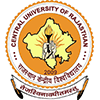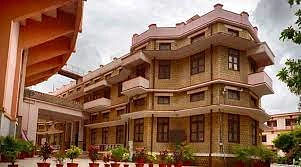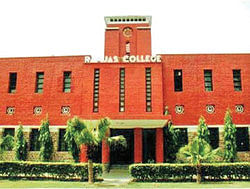Is becoming a Physiologist your dream career option? Check out the complete step by step process on how to become a Physiologist, Eligibility, Exams, Skills Required and Salary in 2024.
Physiologists are biological professionals who are involved in the study of plants and species and their impact on the environment and human life. The Physiologist job outlook is projected to grow at the fastest rate of 10% between 2022 to 2032 with around 1,200 new jobs opening in the role of Physiologist every year over the last decade as per the Bureau of Labor Statistics report.
How to become a Physiologist in India? To become a Physiologist in India, candidates must earn a bachelor's in biology or physiology, opt for higher education with specializations like clinical or exercise physiology, followed by obtaining certification and hands-on experience through internships and projects. The average Physiologist salary in India ranges from INR 3 to 7.2 LPA based on the domain knowledge and expertise. The salary range can go up to INR 14 LPA with 3-5 years of work experience.
Table of Contents
- How to Become a Physiologist?
- Who is a Physiologist?
- What Does a Physiologist Do?
- How Long Does it Take to Become a Physiologist?
- Physiologist Vs Physiotherapist
- Physiologist Salary in India
How to Become a Physiologist?
A career as a Physiologist is best suited for candidates with a great passion and interest in research and study of plants and species and their effect on human life right from their reproduction, food, diseases, etc. Here is the step-by-step guide on how to become a Physiologist:
- Step 1: Earn a Bachelor’s Degree
- Step 2: Opt for Higher Education
- Step 3: Pursue Certification Courses
- Step 4: Enhance Required Skill Set
- Step 5: Gain Hands-on Experience Through Internship
- Step 6: Apply for Physiologist Jobs
- Step 7: Continuous Learning and Development
Step 1: Earn a Bachelor’s Degree
The first step to becoming a Physiologist is to complete class 10+2 with Physics, Chemistry and Biology as main subjects with at least 50% aggregate marks and pursue a bachelor’s degree in the field of Physiology or Biology.
Additionally, the candidate may also be required to take entrance exams such as CUET, AUCET, SET, etc to be eligible for the admission process. Listed below are some of the top undergraduate courses to become a Physiologist:
|
UG Courses |
Entrance Exam |
Top Colleges |
|
CUET, AUCET |
University of Calcutta, Christian Medical College, AIIMS New Delhi |
|
|
CUET, JMIEE, BHU UET |
Indraprastha College for Women, Gargi College, University of Calcutta |
|
|
AUCET, CUET, SET |
Christ University, Bethune College, Christ University |
|
|
CUET, AUCET, JEST |
Miranda House, Ramjas College, Gargi College |
|
|
BA Physiology |
JMI EE, BHU UET |
Lady Shri Sai Ram College for Women, Christ University, Fergusson College |
|
BSc Plant Physiology |
CUET, BHU UET |
Indian Agricultural Research Institute, BHU, TamilNadu Agricultural University |
Step 2: Opt for Higher Education
The role of a Physiologist requires extensive domain knowledge and educational background and thus it is recommended for candidates to opt for master’s and doctoral degrees in Physiology to get a competitive edge. Listed below are some of the courses students can pursue after completing their bachelor’s degree:
Postgraduate Courses
Candidates can opt for postgraduate degrees in physiology such as MA Physiology, MSc Crop Physiology, MPhil Physiology, etc to enhance their knowledge in the field of Physiology. Listed below are some of the Physiology master’s courses:
|
PG Courses |
Entrance Exam |
Top Colleges |
|
INI CET, MET, CUET PG |
Sri Ramachandra Institute of Higher Education and Research, AIIMS, IntregraL University |
|
|
MA Physiology |
INI CET, MET, CUET PG |
Jamia Hamdard University, Kasturba Medical College, JIPMER Puducherry |
|
MA Applied Physiology |
CUET PG |
SS Academy of Higher Education and Research, Amrita University |
|
MSc Crop Physiology |
INI CET, MET |
Chandra Shekhar Azad University of Agriculture & Technology, Assam Agricultural Univerisity, GBPUAT |
|
M.Phil - Exercise Physiology And Nutrition |
Merit-Based |
University College of Medical Sciences, BLDE, Sikkim Manipal Institute of Medical Sciences |
Doctorate Degrees
Furthermore, candidates can pursue doctoral degrees in Physiology such as PhD in Physiology, PhD in Biology, PhD in Life Sciences, etc. Listed below are the doctorate degrees students can opt for to become a Physiologist:
|
PhD Courses |
Duration |
Top Colleges |
|
PhD Physiology |
3 Years |
Bharati Vidyapeeth Deemed University Medical College, Kasturba Medical College |
|
PhD Biology and Applied Sciences |
3-5 Years |
Jamia Millia Islamia, IISC, Aligarh Muslim University |
|
PhD Biomedical Technology |
3-5 Years |
IIT New Delhi, IIT Hyderabad, IIT BHU |
|
PhD Biometry |
3 Years |
Institute of Life Science, Bhubaneswar, IIT Kanpur, IIT Gandhinagar |
Step 3: Pursue Certification Courses
Candidates aiming to become a Physiologist might consider pursuing additional certification courses for better career opportunities and employment opportunities abroad. Listed below are some of the certification courses that can be taken to become a Physiologist:
- ACSM Certified Exercise Physiologist Course
- General Pathophysiology
- Physiology: the Science of Life
- Certification course on Exercise Physiology
- Certificate Course in Sports & Fitness Nutrition
| Top BSc Physiology Colleges in India | Top MSc Physiology Colleges in India |
Step 4: Enhance Required Skill Set
The next step to becoming a successful Physiologist is to develop the relevant scientific and soft skills to apply the concepts in real-life situations. Listed below are the skills required to become a Physiologist:
- Scientific Skills: Scientific skills are highly recommended for candidates aspiring to become a Physiologist as the job role involves skills such as Physiological design experiments, statistical analysis, product testing and research.
- Technical Skills: In the ever-changing world of technology, it is important to learn and develop technical skills such as computer literacy, database management, spreadsheet skills, and visualisation skills as a Physiologist is often involved in reporting and documentation.
- Soft Skills: Demonstrating a strong set of soft skills such as communication, observation, analytical thinking, and problem-solving would open up opportunities and career progression for candidates aiming to become a Physiologist
Step 5: Gain Hands-on Experience Through Internship
It is important to apply practical skills and theoretical knowledge in real-life situations to gain confidence and hands-on experience. To attain this, candidates can apply for internship opportunities in various industries such as healthcare, research institutes, developmental centres, educational institutions, etc to enhance their knowledge and skills.
During the internship, the candidate will be exposed to various levels of work processes such as testing, research, experiments, data collection and analysis, clinical assessment, and usage of various instruments and equipment used in the research and development process by shadowing and observing the peers in an organization
Additionally, students can also participate in research projects and activities by volunteering in research institutes, educational institutions, organisations and government agencies.
Also, Check: How to Introduce Yourself in an Interview
Step 6: Apply for Physiologist Jobs
The final step to becoming a Physiologist is to apply for a job by creating a resume and cover letter attaching all the required information such as experience, skill set, educational background, etc. Listed below are some of the Physiologist job designations and their average entry-level salary details:
|
Physiologist Job Role |
Average Entry-Level Salary |
|
Research Physiologist |
INR 3.6 LPA |
|
Clinica Physiologist |
INR 4.0 LPA |
|
Exercise Physiologist |
INR 7.2 LPA |
|
Rehabilitation Therapist |
INR 4.8 LPA |
|
Medical Technician |
INR 2.9 LPA |
Step 7: Continuous Learning and Development
The field of Physiology is ever-evolving with new technologies and high demand for innovation to enhance sustainability. Candidates aiming to become a Physiologist must keep themselves focused on continuous improvement in learning and development by attending conferences, webinars, online courses, seminars, workshops, etc to stay at the forefront in the field.
Candidates must stay updated with new research and advancements as it is essential for career progression. They can volunteer to join networking events with physiology professionals to enhance their knowledge.
Who is a Physiologist?
A Physiologist is a professional who researches and studies plant and animal species including their anatomy and physiology, reproduction, disease factors, etc and their impact on the environment and human life. By conducting various research and studies about living species, Physiologists are employed in diverse fields such as Health care institutions, Medical Institutions, Research Institutions, Pharmaceutical firms, etc.
Physiologists are highly trained and skilled professionals who have expertise in every function of the cell and its functions and structure. Based on their area of specialisation and domain, the job duties and responsibilities vary such as research, experiment, innovation and development.
What Does a Physiologist Do?
Physiologist are involved in various activities based on their area of expertise and domain knowledge starting from research and testing to innovation. Listed below are some of the Physiologist's job responsibilities:
- Responsible for researching and implementing various scientific methods and technologies.
- Analysing various sets of cell structures to investigate and innovate new technologies and solutions
- Responsible for writing research papers and journals for scientific news and publications
- Conducting various sets of clinical trials and assessments to invent new medical equipment and technologies
- Collaborating with teammates in various activities such as research, investigation, diagnostic procedures, report handling, etc.
- Promoting public health awareness by conducting and explaining the contaminations and safety hazards posed by chemicals to the environment.
How Long Does it Take to Become a Physiologist?
To become a Physiologist in India, it typically takes around 4 to 5 years as it involves extensive educational qualifications and domain knowledge along with clinical hands-on experience. Some candidates may also prefer investing an additional two years in pursuing doctoral studies and certification courses to further enhance their knowledge.
Types of Physiologist
The Physiologist types are vast ranging from clinical physiologist to exercise physiologist the designation varies as per the expertise and work experience of the candidate. Listed below are some of the types of Physiologist in India:
1. Clinical Physiologist
Clinical Physiologists are involved in the innovation and development of advanced medical instruments and equipment by studying and researching various health conditions, symptoms and treatment options. They are often employed in healthcare settings, diagnostic settings, pharmaceuticals, etc. Countries such as the USA, UK, Australia might require licensure to practice as a clinical physiologist.
2. Exercise Physiologist
Exercise Physiologists are professionals who health educate clients on various aspects of physical fitness, exercises and physical well-being to maintain their overall system including cardiovascular, respiratory, digestive system, etc. They are employed in settings like rehabilitation centres, health and Wellness centres, Physiotherapy units, Hospitals, etc.
3. Research Physiologist
Research physiologists are professionals who are mainly involved in the research and development process by studying various species, plants, and animals and their impact on human life to innovate new technologies and medicines. They are employed in Research Centers, Diagnostic Laboratories, Medical Laboratories, etc.
4. Cardiovascular Physiologist
Cardiovascular Physiologists are the ones who specialise in inventing and implementing technologies and instruments related to the cardiovascular systems including the heart and the blood vessels. They work on investigating various disease conditions related to the cardiovascular system such as hypertension, cardiac arrest, thrombocytosis, etc. by interpreting and developing management techniques.
5. Neuro Physiologist
Neuro Physiologists are professionals who study and research the nervous system including the brain, spinal cord, cranial nerves, etc. by investigating various neurological conditions such as Alzheimer's, Parkinson's Disease, and Hemiplegia to interpret and innovate technologies and aids to ease the patient's lifestyle
Physiologist Vs Physiotherapist
Physiologists are biological professionals involved in the research and study of plants, animals and humans to analyse their structural and functional development to innovate new technologies. Physiotherapists are medical professionals involved in the treatment of mobility and functional ability that has been lost or decreased due to health ailments.
Here is the comparison between Physiologist and Physiotherapist based on various parameters:
|
Career |
Physiologist |
Physiotherapist |
|
Duties |
Responsible for research and development activities by studying various cell structures to implement new technologies and instruments. |
Responsible for improving the mobility and lifestyle of patients affected by various medical illnesses through exercises and health education |
|
Educational Requirements |
BSc Physiology, BA Physiology, BA Plant Physiology |
BPT, Masters in Physiotherapy |
|
Skills Required |
Active Listening, Critical Thinking, Research Skills |
Communication Skills, Time Management, Tolerance and Patience, Physical Fitness |
|
Average Salary |
INR 3.0 - 7.2 LPA |
INR 3-6 LPA |
|
Area of Recruitment |
Research and development centres, Government Agencies, Physical Wellness Centers |
Healthcare Settings, Sports Training Institutions, Physiotherapy Clinics |
Physiologist Salary in India
The average Physiologist salary in India ranges from INR 3 to 7.2 LPA based on the domain knowledge and expertise and the range can go up to INR 14 LPA with few years of work experience. The average Physiologist's monthly salary ranges from INR 17,000 to NR 25,000.
Listed below are some of the Physiologist job designation and their salary details:
|
Physiologist Job Role |
Average Salary |
Salary after 5+Years of Experience |
|
Exercise Physiologist |
INR 7.2 LPA |
INR 11.7 LPA |
|
Research Physiologist |
INR 5.9 LPA |
INR 15 LPA |
|
Neuro Physiologist |
INR 6.6 LPA |
INR 11.9 LPA |
|
Cardiac Physiologist |
INR 6.5 LPA |
INR 14 LPA |
|
Health and Wellness Consultant |
INR 4.8 LPA |
INR 10.8 LPA |
|
Clinical Physiologist |
INR 5.0 LPA |
INR 12.5 LPA |
Benefits of Becoming a Physiologist
A career as a Physiologist has a great scope in India and abroad due to increasing demand for innovation and technology in the fields of medicine, healthcare, pharmaceuticals, etc. Listed below are some of the important benefits of becoming a Physiologist:
- Diverse Career Opportunities: Candidates will have enormous opportunities to choose from as physiologists are recruited by various industries starting from healthcare to government agencies.
- Competitive Salary: With an increase in demand for constantly evolving technologies, there is a need for skilled professionals in most industries and thus Physiologist are paid better salaries for most of the job roles as per the industry standards
- Job Satisfaction: This is one of the careers where the candidate will experience a high level of job satisfaction as it plays an impressive role in the promotion of health benefits and fitness practices.
- Flexibility: Due to its diverse stream, candidate can choose to work in any industry as per their area of interest and specialization such as hospitals, laboratories, educational institutions, research centres, etc
Drawbacks of Becoming a Physiologist
Candidates must also understand the disadvantages of becoming a Physiologist before choosing a career in the field. Here are some of the pointers to consider:
- Competitive Job Market: Within an organization, the candidate might have struggles in acquiring research positions, opportunities and designations as there is a high demand for Physiologist in the job market
- Challenges in Work-Life Balance: Due to intensive research and demanding projects, candidates might find it difficult to maintain a work-life balance.
- Rigorous Coursework: The job role of a Physiologist requires extensive research, studies and coursework to develop or optimise a process.
- Stressful Work Environment: Physiologists often experience stressful working conditions and long hours due to the demand for new technologies and the research and testing process involves more time and energy.


















POST YOUR COMMENT